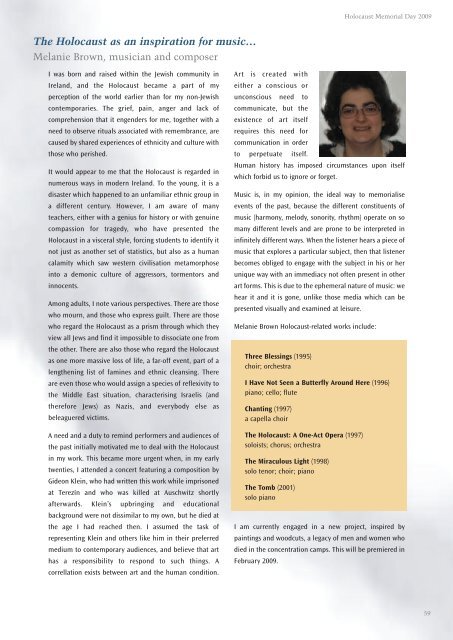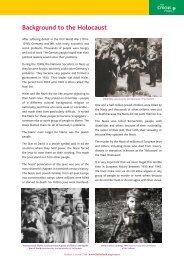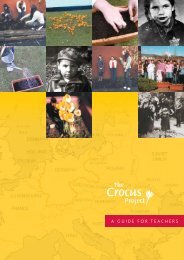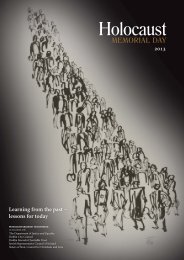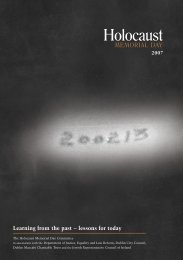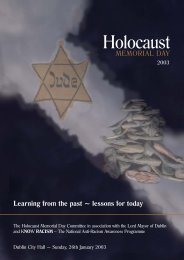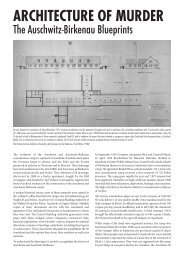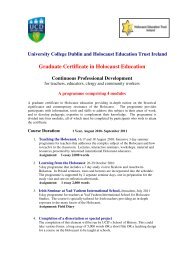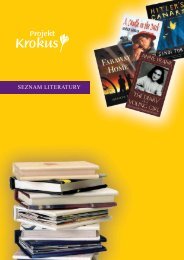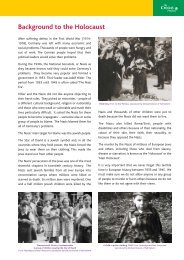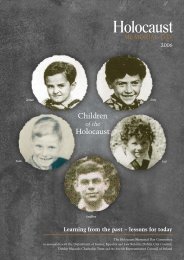Learning from the past ~ lessons for today - Holocaust Education ...
Learning from the past ~ lessons for today - Holocaust Education ...
Learning from the past ~ lessons for today - Holocaust Education ...
You also want an ePaper? Increase the reach of your titles
YUMPU automatically turns print PDFs into web optimized ePapers that Google loves.
<strong>Holocaust</strong> Memorial Day 2009<br />
The <strong>Holocaust</strong> as an inspiration <strong>for</strong> music…<br />
Melanie Brown, musician and composer<br />
I was born and raised within <strong>the</strong> Jewish community in<br />
Ireland, and <strong>the</strong> <strong>Holocaust</strong> became a part of my<br />
perception of <strong>the</strong> world earlier than <strong>for</strong> my non-Jewish<br />
contemporaries. The grief, pain, anger and lack of<br />
comprehension that it engenders <strong>for</strong> me, toge<strong>the</strong>r with a<br />
need to observe rituals associated with remembrance, are<br />
caused by shared experiences of ethnicity and culture with<br />
those who perished.<br />
It would appear to me that <strong>the</strong> <strong>Holocaust</strong> is regarded in<br />
numerous ways in modern Ireland. To <strong>the</strong> young, it is a<br />
disaster which happened to an unfamiliar ethnic group in<br />
a different century. However, I am aware of many<br />
teachers, ei<strong>the</strong>r with a genius <strong>for</strong> history or with genuine<br />
compassion <strong>for</strong> tragedy, who have presented <strong>the</strong><br />
<strong>Holocaust</strong> in a visceral style, <strong>for</strong>cing students to identify it<br />
not just as ano<strong>the</strong>r set of statistics, but also as a human<br />
calamity which saw western civilisation metamorphose<br />
into a demonic culture of aggressors, tormentors and<br />
innocents.<br />
Among adults, I note various perspectives. There are those<br />
who mourn, and those who express guilt. There are those<br />
who regard <strong>the</strong> <strong>Holocaust</strong> as a prism through which <strong>the</strong>y<br />
view all Jews and find it impossible to dissociate one <strong>from</strong><br />
<strong>the</strong> o<strong>the</strong>r. There are also those who regard <strong>the</strong> <strong>Holocaust</strong><br />
as one more massive loss of life, a far-off event, part of a<br />
leng<strong>the</strong>ning list of famines and ethnic cleansing. There<br />
are even those who would assign a species of reflexivity to<br />
<strong>the</strong> Middle East situation, characterising Israelis (and<br />
<strong>the</strong>re<strong>for</strong>e Jews) as Nazis, and everybody else as<br />
beleaguered victims.<br />
A need and a duty to remind per<strong>for</strong>mers and audiences of<br />
<strong>the</strong> <strong>past</strong> initially motivated me to deal with <strong>the</strong> <strong>Holocaust</strong><br />
in my work. This became more urgent when, in my early<br />
twenties, I attended a concert featuring a composition by<br />
Gideon Klein, who had written this work while imprisoned<br />
at Terezín and who was killed at Auschwitz shortly<br />
afterwards. Klein’s upbringing and educational<br />
background were not dissimilar to my own, but he died at<br />
<strong>the</strong> age I had reached <strong>the</strong>n. I assumed <strong>the</strong> task of<br />
representing Klein and o<strong>the</strong>rs like him in <strong>the</strong>ir preferred<br />
medium to contemporary audiences, and believe that art<br />
has a responsibility to respond to such things. A<br />
correllation exists between art and <strong>the</strong> human condition.<br />
Art is created with<br />
ei<strong>the</strong>r a conscious or<br />
unconscious need to<br />
communicate, but <strong>the</strong><br />
existence of art itself<br />
requires this need <strong>for</strong><br />
communication in order<br />
to perpetuate itself.<br />
Human history has imposed circumstances upon itself<br />
which <strong>for</strong>bid us to ignore or <strong>for</strong>get.<br />
Music is, in my opinion, <strong>the</strong> ideal way to memorialise<br />
events of <strong>the</strong> <strong>past</strong>, because <strong>the</strong> different constituents of<br />
music (harmony, melody, sonority, rhythm) operate on so<br />
many different levels and are prone to be interpreted in<br />
infinitely different ways. When <strong>the</strong> listener hears a piece of<br />
music that explores a particular subject, <strong>the</strong>n that listener<br />
becomes obliged to engage with <strong>the</strong> subject in his or her<br />
unique way with an immediacy not often present in o<strong>the</strong>r<br />
art <strong>for</strong>ms. This is due to <strong>the</strong> ephemeral nature of music: we<br />
hear it and it is gone, unlike those media which can be<br />
presented visually and examined at leisure.<br />
Melanie Brown <strong>Holocaust</strong>-related works include:<br />
Three Blessings (1995)<br />
choir; orchestra<br />
I Have Not Seen a Butterfly Around Here (1996)<br />
piano; cello; flute<br />
Chanting (1997)<br />
a capella choir<br />
The <strong>Holocaust</strong>: A One-Act Opera (1997)<br />
soloists; chorus; orchestra<br />
The Miraculous Light (1998)<br />
solo tenor; choir; piano<br />
The Tomb (2001)<br />
solo piano<br />
I am currently engaged in a new project, inspired by<br />
paintings and woodcuts, a legacy of men and women who<br />
died in <strong>the</strong> concentration camps. This will be premiered in<br />
February 2009.<br />
59


